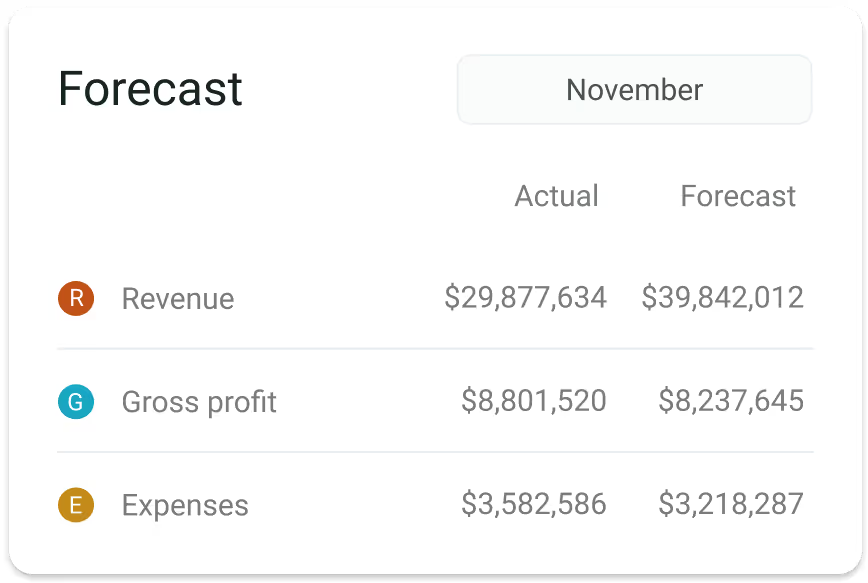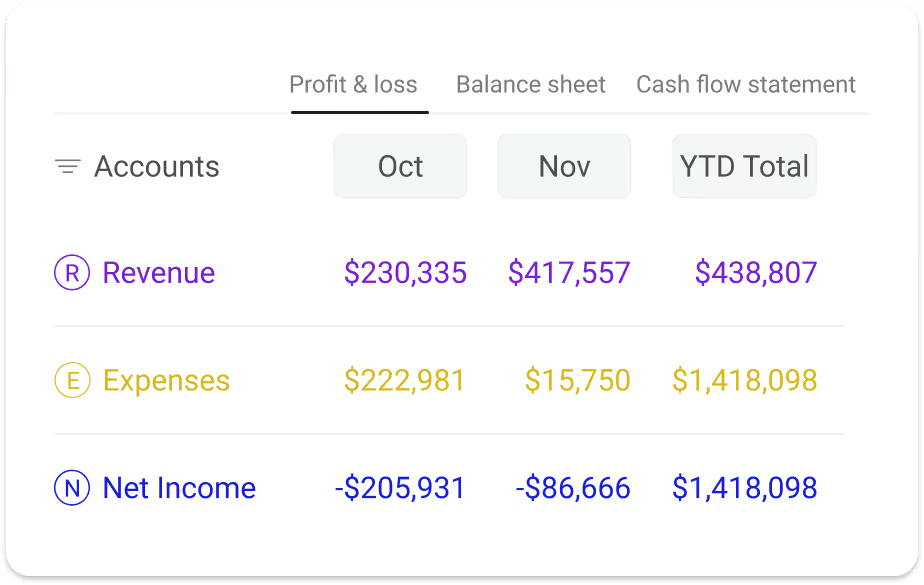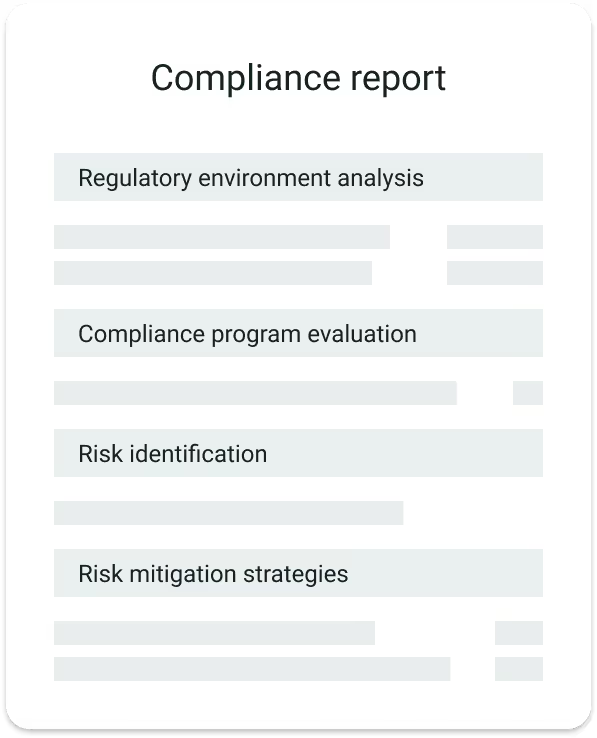Fractional CFO services: your startup's secret weapon
Hiring a full-time chief financial officer is costly, but without an expert CFO's support, founders can make decisions blind.
Hiring a fractional CFO is a cost-effective alternative that provides the guidance and financial strategy of a full-time CFO. A fractional CFO makes efficient decisions based on your startup’s financial health.
.webp)
What is a fractional CFO?
A fractional chief financial officer/CFO (sometimes called an outsourced CFO or virtual CFO) is a financial professional who provides CFO services on a part-time or project basis. Think of them as freelance finance specialists who contract with your business and offer similar services to a regular CFO without long-term, full-time, often expensive commitments.
A full-time CFO, fractional CFO responsibilities go beyond basic bookkeeping. We’ll cover a fractional CFO’s roles in more depth below, but these can include creating a multiple-year financial model, building reliable projections, managing cash flow, creating an equity and debt financing strategy, providing an annual startup budget, and more.
When ready, you can easily hire an outsourced CFO directly or through an outsourced CFO service that connects your startup with the right virtual CFO for your needs.The convenience of getting access to the support of an expert CFO in minutes rather than months—along with the lower prices of short-term commitments—makes fractional CFOs a popular option for startups.
Fractional CFO vs. full-time CFO
A fractional CFO is a professional who works part-time or project-based for your business and gets paid per project or hours worked. This also means that fractional CFOs can choose to work for multiple clients simultaneously. However, fractional CFOs have often worked with various businesses and can bring a fresh perspective to your financial operations.
On the other hand, a full-time CFO is a professional who works for your business full-time and is available to work on your financial matters exclusively – this is one of the main advantages. Full-time chief financial officers are also paid an annual salary for their services and are eligible for company benefits. However, a full-time CFO salary averages $300,000 - $500,000 per year, which most early-stage startups can’t afford.
Both types of CFOs can provide the same services. However, one of the main benefits of a fractional CFO for startups is cost savings. Since you only pay for their work hours, you can save money compared to hiring a full-time CFO, who requires a monthly payment.
A fractional CFO can also serve as an interim CFO. Companies that hire full-time CFOs often hire interim CFOs on a fractional basis to cover gaps in-between full-time hires.
.avif)
As a small business, making the most of your budget is critical, so a fractional CFO might be a good option to avoid spending more than you have to. To determine if hiring a fractional CFO is right for your business, look at your budget, current needs, and long-term goals.
If your startup doesn’t have the budget to hire a full-time CFO ($300,000 - $500,000 per year), then fractional CFO services are ideal. Once you know how much you’re willing to pay, look at your needs. If you only need, for example, a three-year financial forecast or an annual budget that takes a few weeks to create, you can hire a fractional CFO to take care of it.
After you determine whether or not you should hire a fractional CFO instead of a full-time employee, you can decide on the right time to do so. Some common situations indicate the right moment to hire a fractional CFO:
- You're struggling to understand your financial reports or make sense of the numbers.
- You're having trouble balancing your financial obligations, such as paying bills on time, managing your cash flow, or reporting to investors.
- You're planning to expand your business.
Should I hire a fractional CFO and when?
As a small business, making the most of your budget is critical, so a fractional CFO might be a good option to avoid spending more than you have to. To determine if hiring a fractional CFO is right for your business, look at your budget, current needs, and long-term goals.
If your startup doesn’t have the budget to hire a full-time CFO ($300,000 - $500,000 per year), then fractional CFO services are ideal. Once you know how much you’re willing to pay, look at your needs. If you only need, for example, a three-year financial forecast or an annual budget that takes a few weeks to create, you can hire a fractional CFO to take care of it.
After you determine whether or not you should hire a fractional CFO instead of a full-time employee, you can decide on the right time to do so. Some common situations indicate the right moment to hire a fractional CFO:
- You're struggling to understand your financial reports or make sense of the numbers.
- You're having trouble balancing your financial obligations, such as paying bills on time, managing your cash flow, or reporting to investors.
- You're planning to expand your business.
.webp)
The top 8 fractional CFO services your startup needs
As your startup scales, new financial needs arise. To make the most of your budget, you need to consider key financial tasks that will support your growth. With fractional CFO services, you can take care of those key tasks without overspending. These are some of the best outsourced CFO services you should consider to boost your startup's growth.
1. Cash flow projections
One of the key roles of a CFO is to ensure the organization has a healthy cash flow. Fractional CFO services construct cash flow projections based on historical and current data to help you plan and make informed business decisions. This can include projecting cash inflows and outflows and identifying potential issues and opportunities.
2. Forecasting
Financial forecasts are estimates of a company's future financial performance based on historical data and expected future economic and market conditions. A fractional CFO can provide budget forecasting services to help you plan for the future. This can include forecasting revenue, expenses, and other key metrics. Using data and analytics helps you develop a more accurate and reliable view of the future for your business so you can plan ahead.
3. Fundraising support
Fractional CFO services can provide critical support if your organization wants to raise funds. They can help by developing financial projections, building reports, and creating presentations for potential investors. These financial documents are key during fundraising rounds because they all depict your startup’s present and expected future performance. Plus, investors don’t often fund startups without them. They can also help you identify your business's most appropriate funding sources and assist with fundraising.
4. KPIs/metrics tracking
KPIs are essential to any business’s financials because they measure your team's performance. However, keeping track of these metrics can be challenging for startups without a full-time CFO. A fractional CFO can assist in tracking key performance indicators and other important metrics, such as revenue growth or profit margin. By tracking these metrics, you can measure the success of your business and make data-driven decisions. These professionals can also track their own CFO KPIs.
5. Financial modeling
A fractional CFO can do financial modeling for startups to assess the feasibility of new projects, investments, or business strategies. This can help you avoid costly mistakes because financial models like the Sensitivity Analysis predict what would happen to your financials in certain situations. For example, how your financials would be affected after increasing your prices. This way, you never have to make decisions in the dark. Fractional CFOs can also provide guidance and support on using their financial models effectively and making the most of the insights they provide.Many companies don’t make proper use of financial statements or have efficient data collection processes for their creation. That’s often a great starting place.
6. Annual business budgeting
This type of service can also assist with developing a comprehensive startup budget that considers projected revenues, expenses, and financial goals. They can also help the startup monitor its financial performance throughout the year and adjust the budget as needed. This can help the startup stay on track with its financial objectives and make informed decisions about resource allocation.
7. Go-to-market strategy creation
A go-to-market strategy is essential to launching and growing a startup. A fractional CFO can help create a go-to-market strategy by providing revenue forecasts, analyzing market trends, developing pricing strategies, and developing financial models to ensure your launch is financially viable. Additionally, the fractional CFO you hire can help identify potential funding sources to support the go-to-market strategy.
8. Financial strategy and risk management
Companies need to employ a broader financial strategy that limits expenses, limits risks, and optimizes cash flow. CFOs bring expert knowledge to the table that many CEOs didn’t know they didn’t know.
For example, risk management involves getting the right types of insurance. It could also mean increasing savings or cash on hand, paying down debt, accessing lower cost business financing, or parking temporary cash reserves in places with higher interest rates.
Limiting financial risk is key to any strategic financial planning. What’s your plan for that?
Financial strategy should be a highly-tailored fit for every company. There are numerous financial management practices to optimize as a business grows. What bookkeeping services and software are you using? Do you use controller services? Is your CPA firm doing a good job of reporting and filing your taxes?
An experienced CFO can help you sort all of this out, or handle any complex financial challenge your business may be facing.
Sometimes you just need a quarterback to direct all of the financial services and people. If you have outsourced accounting, bookkeeping, and payroll services, it can be helpful for a management team to hire fractional CFO consulting to make sure that everyone is pulling in the same direction.
.webp)
How much does a fractional CFO cost?
The cost of hiring a fractional CFO depends on several factors, including the individual's experience and qualifications, the scope of services provided, and the duration of the engagement. There are two main ways to pay a fractional CFO:
Hourly rate:
The most common way part-time CFO professionals charge is by the hour. Usually, they record their work hours and send you an invoice every pre-defined period. You can also use time-tracking software to ensure all recorded hours are accurate. You can expect fractional CFO pricing of around $300 per hour for highly skilled professionals. With this payment method, you won't know exactly how much you will pay every month since it will depend on the worker.
Monthly payment:
Monthly payments offer a more predictable and consistent cost. This works by determining how many hours of assistance and services you need and then paying a flat monthly fee. This fee can range from $1,000 to tens of thousands of dollars, depending on the level of support needed.
Plus, there may also be additional costs for expenses such as travel. Be sure to discuss these costs with the CFO upfront to avoid any surprises.
Using fractional CFO services is much more cost-effective than a full-time finance team since they can do different financial operations across different roles part-time.
A full-time finance team could cost you over $500,000 per year, considering how much a CFO makes and all the other roles it involves. You don’t have to hire a CFO, accountant, payroll manager, and more. Fractional CFO services can take care of all of it.
You might think that you can handle these responsibilities independently as a founder, which may be true. But running a startup is a challenging job on its own, and CFO tasks are just as demanding. So, not being entirely focused on finances or not having enough experience could lead to costly mistakes. Why risk the financial health of your business when you could hire a fractional CFO?
.webp)
.png)
.webp)
.webp)
.avif)
.webp)
.webp)










